Designing a Comfortable Space to Work From Home
If one thing has become evident in 2020 – besides the popularity of bookcases as Zoom backgrounds – it’s that the design community is a resourceful bunch. Those once used to working in studios, offices, and other creative communal spaces immediately adapted their own homes, materials, and equipment to “make things work” (we see you, pile ‘o books laptop stand). But as we look ahead, this temporary situation is transitioning into something with a more lasting imprint. Many companies are now rolling out permanent or semi-regular “work from home” schedules. In service of this developing reality, we’re sharing some recommendations and resources that have helped us work from home over the years.
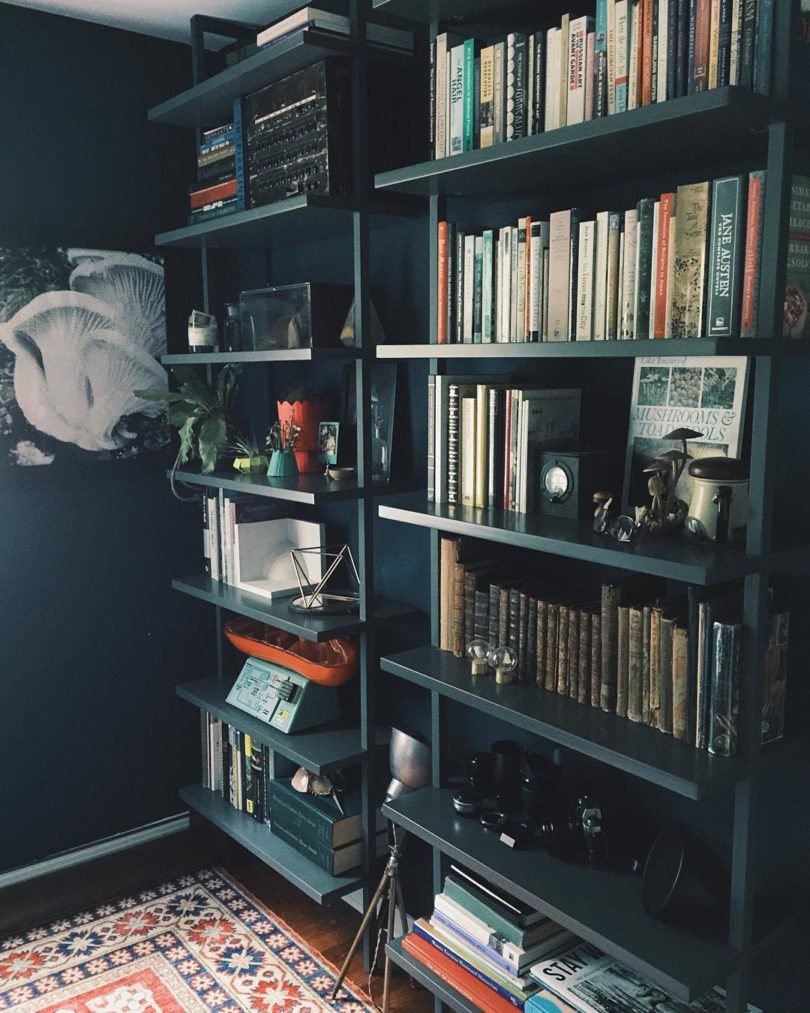
The prerequisite for any designer on Zoom: a bookcase of design objects, curiosities, and books as background. Photo: Gregory Han
Preparing to work from home is no different from any design project, one requiring a comprehensive assessment of daily tasks, personal preferences, and budgetary (alongside spatial) limitations. As someone with experience working from home both a designer and writer over a decade – from a sliver of a room, a converted closet, and now finally in a legitimate home office – I’ve identified a certain hierarchy of needs revealed through a process of trial and error. I’ve categorized these as essentials, accessories, environmental, and comforts.
The Essentials
Any conversation about working from home should begin with ergonomics. While a sofa or dining table can operate as a temporary workspace in a pinch, setting up a dedicated work surface furnished with supportive seating, adequate surface, and sufficient lighting is where the bulk of your investment should be set aside for. Your back, neck, wrists, and eyes will thank you later.

I’ve used/owned numerous task chairs over the years, and while I can recommend my personal favorite (ten years and two Steelcase Leap chairs later), there is no singular “best office chair”.
Your body and preferences of comfort will determine which task chair will feel best over the span of a day. For example, I find a chair with a fully padded back and supportive softer cushioned arms most desirable. Taller people may prefer the Herman Miller Embody because of its elongated back, while the Steelcase Gesture can offer fidgety types adjustable support. My colleagues over at Wirecutter* tested numerous task chairs, if you’d like additional recommendations and want to delve into the minutiae of choosing a comfortable task chair, I highly recommend a read [*disclaimer: I write for the Wirecutter].

The Artifox DESK 02 is currently one of our favorite desk designs, functionally and aesthetically. A built-in dock, cord/cable control, and a hook for headphones makes this an ideal workspace for laptop or desktop users like.
You’ll have much more leeway when it comes to choosing a desk or table to work from. As long as the work surface aligns arms from the chair across to the table at a 90-degree angle, allows the wrists to rest relaxed and supported, and leaves an arm’s distance between you and your monitor, you should be fine using a formal desk, dining table, or even a dressed up fold-out table.
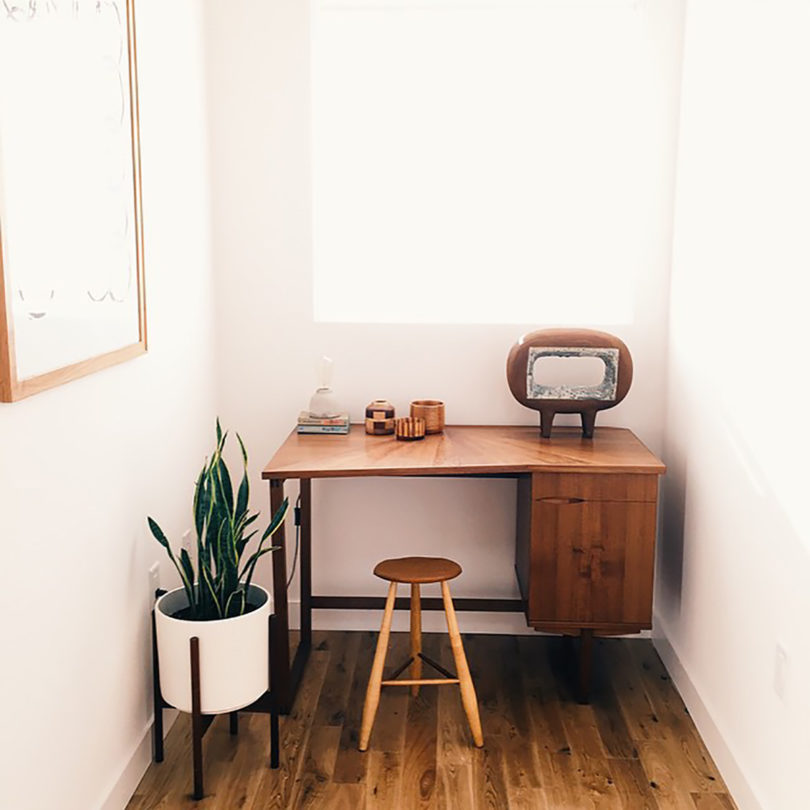
Photo: Gregory Han
Of course, some may prefer to work while standing up, and standing desks are an option. But the same ergonomic criteria used in choosing a traditional desk applies to a standing desk. Just be sure to budget for an anti-fatigue floor mat, an oft forgotten accessory that will help the transition from working seated to standing up.

An LED task lamp like the Z Bar Desk Lamp can provide bright and even lighting to reduce eye strain associated with staring a screen throughout the day, while the multi-adjustable head and arm of this model offers an adaptive repositionable design. Similarly, the FLOS Kelvin, a similar minimalist design from 2009 by Antonio Citterio and Toan Nguyen, has brightly and diligently served me for over a decade.
Remember to incorporate a mixture of direct and indirect lighting in your workspace. Eyes tire while staring at a single source/direction of light. An illuminated room mixing both direct and diffuse light sources will reduce eye strain, so pull in a floor lamp, sconce, and/or overhead light into your home office mix. Here’s a insightful resource to guide this goal.
Accessories

The TP-Link Deco M5 exemplifies the current generation of mesh Wi-Fi systems delivering faster and far reaching internet signals into any corner of the house with an unobtrusive disk-style design.
We all need fast and reliable internet, something especially true in the era of video conferencing, streaming, and keeping every conceivable browser tab open. I recently installed the TP-Link Deco M5 mesh Wi-Fi system in our home and saw our wireless speeds spike +50 to 100 Mbps faster in every room of our home compared to our previous system, the signal reaching further and more dependably too.
Your mileage may vary, depending upon the layout and size of your home. Most consumer grade mesh systems are now plug-and-play, requiring only a minimal amount of tech know-how to get going. If you haven’t upgraded your wireless router in the last five year old and you’re experiencing slow Wi-Fi speeds, you might be pleasantly surprised with the return on investment this provides.

You Zoom, I Zoom, we all Zoom from whatever room. If video conferencing is a daily requirement – and for many of us it has become part and parcel for work – upgrading from a built-in laptop or desktop webcam to a dedicated webcam can result in drastic improvements. The Logitech BRIO is unanimously touted as one of the best, if not best, dedicated consumer webcam, offering 4K resolution and a high dynamic range picture, with an adjustable wide field of view. Partner it up with a dedicated USB microphone like the Blue Yeti, and you’ll look and sound considerably better (even though you may still be wearing pajamas from the waist down).

Working from home means noises once absent from the work environment can become part of your daily aural environment. I have a neighbor who loves to swear profusely while working on repairing his deck. To put it politely, it’s distracting.
Other friends have complained working with children, laundry, pets, and a myriad of other household sounds has made concentration impossible since being forced to work from home. A pair of active noise canceling headphones like the Beoplay H9 is always one of the first things I’ll recommend. I wear a pair of ANC cans even without music to dampen any distracting din down several notches.

The sleekly designed ASUS ProArt StudioBook Pro 17 has been my satisfying reintroduction back to using a laptop (and Windows) at home, operating as my primary machine during these days in quarantine. Aimed at designers, architects, animators and other creative professionals who covet screen space and the proficiency of running graphics intensive software without a hit, the “17” laptop that fits in a 15” briefcase” is more than proficiently powered by a six-core Xeon processor and Nvidia Quadro RTX graphics card. There’s a gimmicky dual function display/touchpad that I could live without, but the ASUS’s vivid 16:10 Pantone-validated display is glorious, and has made editing/processing images in Photoshop at full clip a reality.

A laptop like the one above does introduce ergonomic issues. Anyone required to hunch over a laptop for hours can attest its lasting effects across the shoulders, backs, and arms. The most ideal solution is to dock a laptop to an external monitor and keyboard, a set up I used for years before switching to an Apple iMac. A more affordable option is a laptop stand.
The MOFT Z has caught my eye for its clever origami-like design, adaptable for use in both standing and seated positions, bringing the laptop screen to an ergonomic eye level – personally a preferable option to an overly large dedicated standing desk.
Environmental
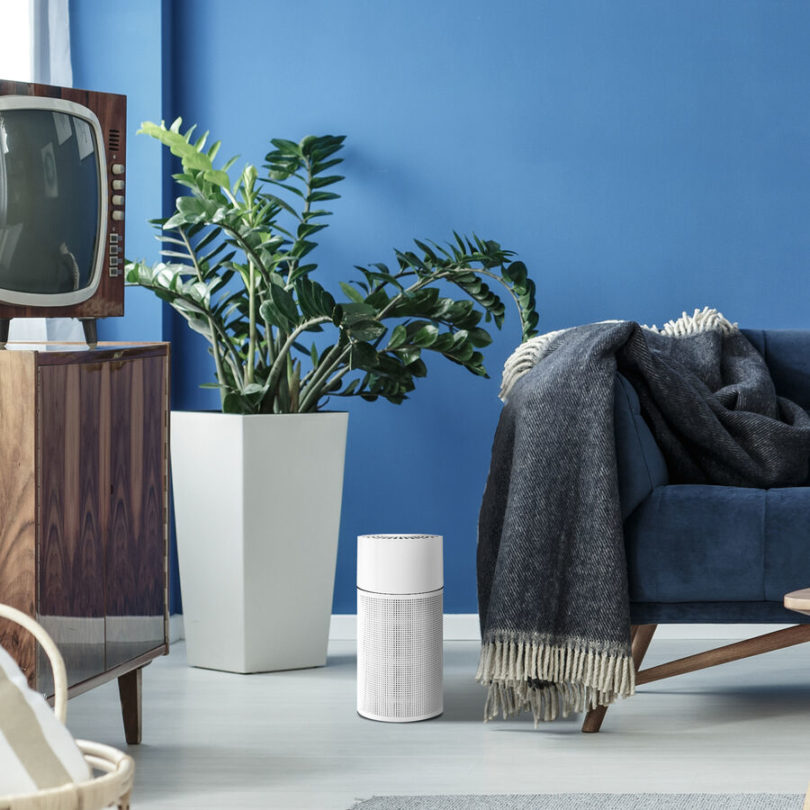
Most people wouldn’t prioritize or even think of an air purifier as a WFH essential. That’s a mistake, as there’s hardly anything more important than the quality of air we breathe throughout the day, especially while working within a household shared with family, roommates or pets. We like the $139 Blue Pure 411+, a highly efficient air purifier capable of removing 99.97% of airborne particles, including pollen, dust, and dander in rooms up to 185 square feet in size. Its attractive compact cylindrical design makes it easy to position openly in the average small home office.
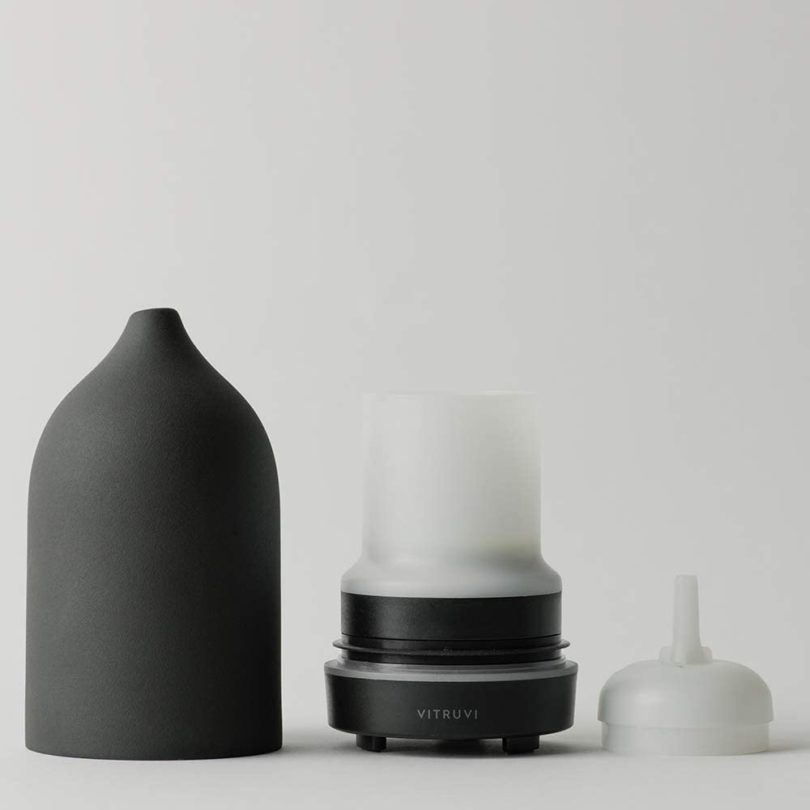
Complementing an air purifier, a humidifier/diffuser can make any room feel more comfortable throughout the year. Muji offers a pair of scent diffusers we’ve used as humidifiers in the past. Our current favorite is the Vitruvi Stone Diffuser, arguably the most attractive and an affordable option for keeping the nasal passages from getting to dry.
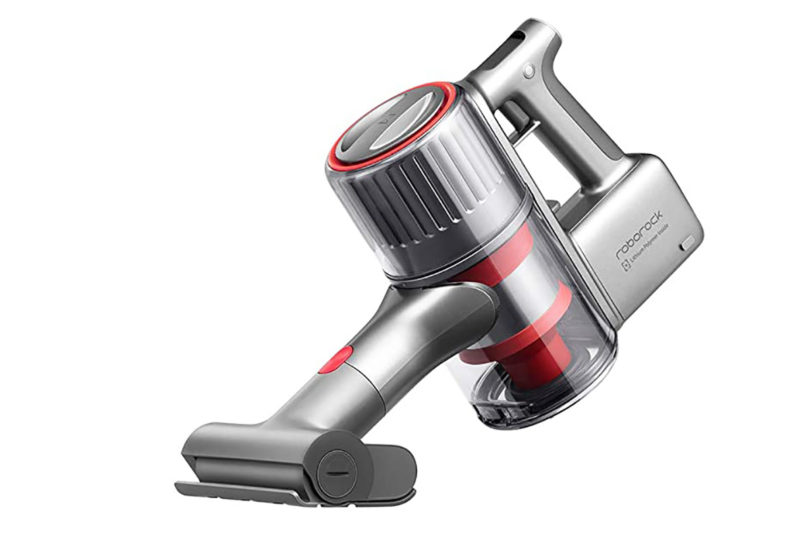
Even if you’ve got an air purifier running 24-7, your work space is going to get dirtier through week. I’ve incorporated a habit of beginning each work day tidying my workspace. While we have an old Dyson to clean up after our pets, I keep a Roborock H6 in my home office closet because it’s lighter, smaller, and sleeker (a design that earned a Red Dot: Product Design award) while also equipped with a robust filtration system to contain 99.97% of allergens. It cleans out crumbs from the keyboard, sucks the occasional uninvited mosquito from the air, and eliminates any evidence of snacking at my desk.
Comforts
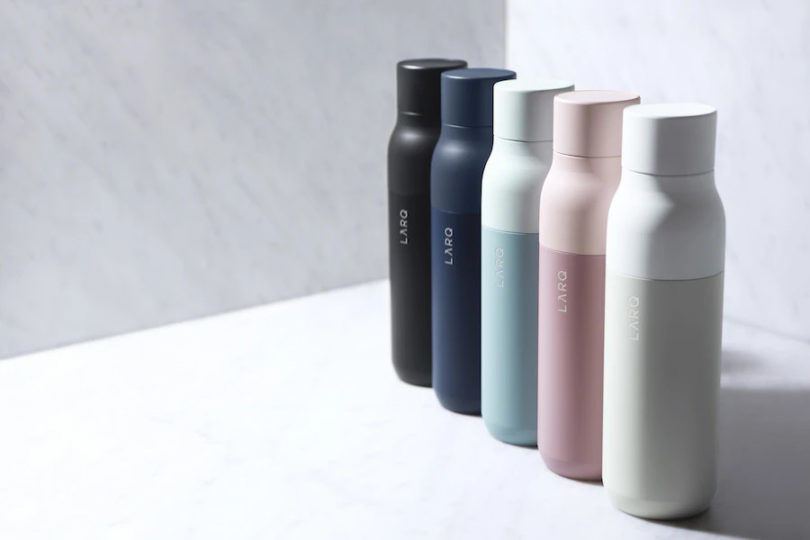
When I asked my colleagues at Design Milk to share their work from home essentials, several mentioned selections intended to make the day more pleasant or comfortable. One of our team mentioned keeping a hi-tech, self-sterilizing LARQ water bottle always at arm’s reach to stay hydrated throughout the day. A plain old reusable plastic or glass bottle should suffice too.
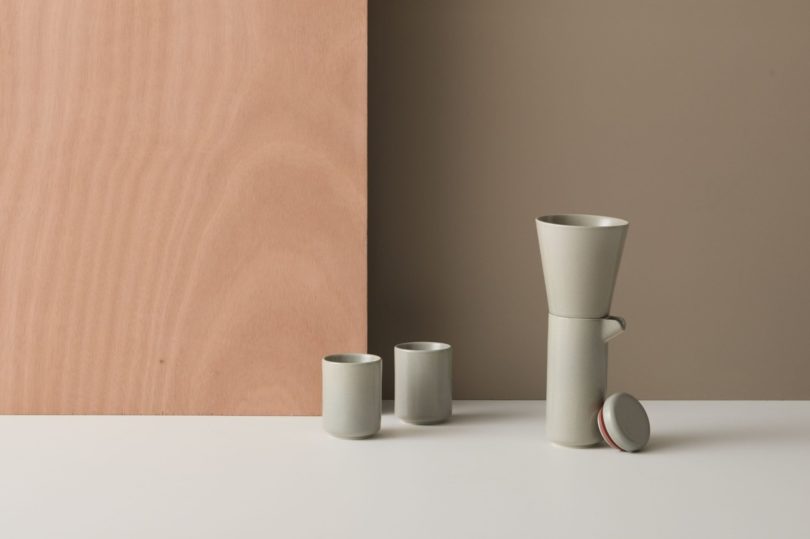
Another replied with her affinity for pour-over prepared coffee: “Being stuck at home isn’t a reason to drink bad coffee. Brewing a fresh cup every morning provides the energy I need to work through the day, and it gives me a morning routine that encourages me to relax and take a mindful moment.” The $56 Gidon Bing Ceramics Ceramic Coffee Dripper use CHEMEX Half Moon filters and is designed to work with an optional twin-wall ceramic pot.

And my own creature comfort while working from home? Warm house slippers. I keep a pair of the $49 Japanese-style house slippers under my desk, a cozy perk to ward off the effects of working from a chilly first floor home office each morning and night.
Complete your work-from-home setup with some office products from our shop—check out our WFH collection here.




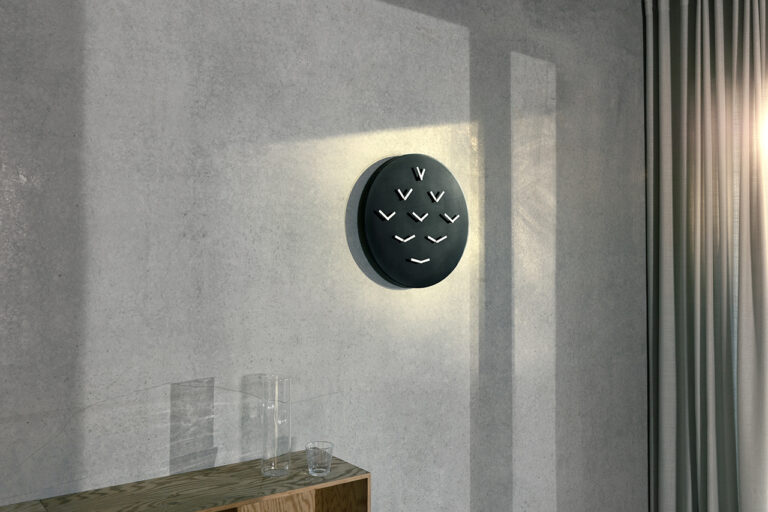
Leave a comment